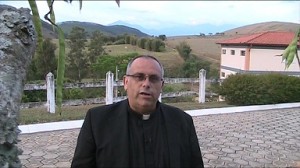 The law must not be simply followed, but followed in love with understanding.
The law must not be simply followed, but followed in love with understanding.
Some time ago, I was walking into Balboa Park in San Diego, California. A man called out to me: “Sonny, can you tell me what time it is?”
I looked at my handy-dandy Seiko world time watch that gave me the current time in every time zone in the world. “It is one-twenty-seven.” I responded.
“One-twenty seven?” He said. “One-twenty-five, one-thirty maybe? Don’t be so exact.”
I want to contrast that with another story. A while ago a man wrote on one of those Catholic internet boards that he ate lunch and afterward attended mass. When the priest began distributing communion, he said, it was fifty-five minutes after he finished his lunch. Since it was not an hour he felt he could not receive communion.
I said that he could have received because it was close enough to an hour.
Immediately, I became the liberal priest. He went off on how the law says that one must wait an hour before receiving communion after eating and fifty-five minutes is not an hour.
I bring up these two examples as two analogies of the law.
In today’s Gospel, we see that the man answered “with understanding” looking beyond a simple legalistic interpretation of the law and moving to a profound understanding of the law of love that is beyond the letter of the law and that understanding is a profound understanding of love.
It is this that fulfills the law, love.
We can see that in the first reading from Deuteronomy:
“Hear, O Israel! The LORD is our God, the LORD alone!
Therefore, you shall love the LORD, your God,
with all your heart,
and with all your soul,
and with all your strength.
Take to heart these words which I enjoin on you today“Dt. 6:6
and “You shall love your neighbor as yourself.” Lv 19:18
St. Augustine summed it up well, “Love and do what you want.” Jesus in the golden rules explains that to love another is to treat them as you have them treat you. That includes everyone.
What this also means is that if you follow the law to the letter, but you do not love, then you are not doing what the law calls you to do. We have a calling to do the loving act and that is greater than the letter of the law proposes.
In fact, if you live the letter of the law perfectly, you will have perfectly fulfilled the minimum standard of your Catholic faith.
What does this love look like. Well, let’s look at what is the effect of lack of love and that will help us understand what love looks like.
Look at what happens when a person whom you love breaks your heart for doing something wrong, maybe it is a friend, a spouse, a relative, even a priest. You can see the long term affects and the permanent damage when a grave sin is committed by this loved.
Each person who is hurt expected greater from that person and they are deeply hurt right to the heart at this act. Their life will never be the same and their ability to trust will never be the same. Further, the person who sinned greatly, now finds himself in a situation where no one looks at him or her the same way. Maybe they completely cut them off from their relationship to him or her forever. Maybe they just stop trusting and lose some or all respect for the person.
Indeed, when someone has to come clean about a sin or a crime or unpopular action they committed, either on their own or through maybe the act comes out in public through one way or another their greatest fear is that people they count on will abandon them.
All of these have to do with the affects of love and the broken bonds of love.
The loving act obviously has the opposite effect. It humanizes people, and changes people so that they grow in being what Christ called them to be.
Sometimes that loving act may not be a nice thing to do, but it is an important.
For example, the girl or boyfriend who does drugs or gets drunk will benefit from the good Catholic who says to them, “You have a choice, either be a friend of me, or a friend of drugs/alcohol you cannot do both.” Hopefully the person chooses to give up drugs/alcohol in the name of love.” Otherwise you are doing the nice thing. There is a fancy word for the nice thing, it is called enabling and actually leads someone deeper into addiction. There is nothing loving about it.
When you choose not to enable, what you are doing is humanizing the person.
How many parents have quoted to your children the fourth commandment? Did you know that St. Paul also says not to nag your children, let they lose heart. How many know that quote?
This would be a good week to look at what actions you do that are loving and what actions you do that are not and what you can change and if you need to do so, consider going to confession.
God bless you,
Fr. Robert J Carr
Fr. Carr is the pastor of Holy Trinity Parish in Quincy, Massachusetts (Check out and Like our facebook page) and is the editor of this blog. He is also an alliance member of the Canção Nova Community (You may also find his videos inVideos.Catholicismanew.org courtesy of iCatholic.com. He also has a regular radio program on WebRadio Canção Nova. Heard Mondays at 7pm (1900 hours) EDT/2400 UTC
You can follow him on twitter as @frbobcarr. Thoughts, comments on the homily? Let us know at either the parish facebook page or the Catholicismanew Facebook page.

